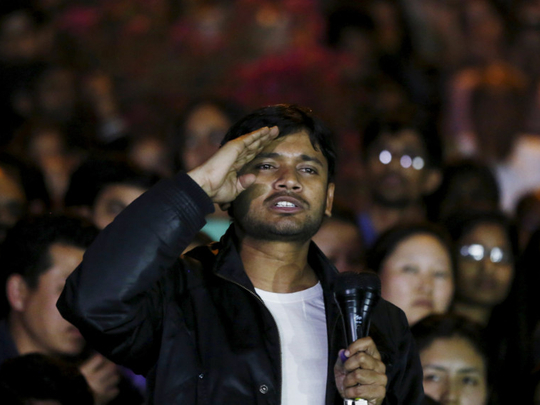
National discourse in India over the past few years has been on corruption, rent-seekers cutting back-room deals, poor governance and Manmohan Singh lampooned as the weakest prime minister India has ever had.
The government of Prime Minister Narendra Modi stormed into power on the back of this creaking dispensation and captured the country’s imagination with clever and modern-sounding slogans such as “achhe din” (good days) and “sab ka sath, sab ka vikas” (development for all). It seemed a clear break from the ten years of the Congress-led alliance. Good days indeed seemed around the corner.
Sadly, in a mere 22 months, the Modi government has lost the goodwill of the people and instead of a government that promised to make India “a nation of the future” — words coined by economist Paul Krugman — it has become entangled with archaic issues of sedition, patriotism and nationalism.
Laws on sedition date back to the Elizabethan era in English history, Mark Twain said a patriot, is a person who can holler loudest without knowing what he is hollering about and nationalism is a 19th century idea birthed in the French revolution. And in the Indian context much of all this was debated long back by Tagore and Gandhi in the 1930s.
How has this come about?
Looking back now, the Modi dispensation was bound to hit a wall because the wind beneath its sail had always been that of the hard-line Rashtriya Swayamsevak Sangh (RSS) — an institution immersed in nativism and antiquated values of a bygone era. Modi cut his teeth in the RSS. He is thus caught between a rock and hard place, for as much as he is an RSS devotee, he is also a man with modern ideas and wishes to engage with the wider world.
Globalisation, internationalism and cutting-edge innovation animate Modi, though some of these ideas are anathema to the RSS. The Bharatiya Janata Party (BJP) and RSS are two sides of the same coin and this inherent contradiction has always been there. In Modi, that has simply got accentuated further and the India story and its trajectory will be decided on how Modi resolves this paradox.
L.K. Advani, in the 1990s, had thundered “we want microchips, not potato chips”, and the BJP itself in its earlier formation was steeped in the Swadeshi (nationalist) campaign — primarily opposition to all things imported — and much of its rhetoric was inward looking, rooted in ancient, not modern, India.
Today it might clothe this embedded contradiction as continuity with change, but if one were to scrutinise this contradiction, it is self-evident that it has never tried to resolve it. This is primarily because without the RSS, the BJP would find it very difficult to gain electoral strength.
If the Congress party, therefore, has become a tool in the hands of the dynasty, the RSS equally has been the puppeteer when it comes to the BJP — the remote control has always been locked up in Nagpur, the headquarters of the RSS. And the RSS has never tested itself directly in the turbulent waters of India’s elections.
The head of the RSS, an unelected official, virtually runs India when the BJP is in power, similar to the alleged corrupt and power-hungry dynasty leaders — Sonia Gandhi and Rahul Gandhi — who at least routinely stand for elections and are exposed to the whims and fancies of the public mood. Raebareli and Amethi may be their pocket boroughs, but they are answerable to their constituency and the wider public. But what about the chief of the RSS?
To turn the spotlight on the RSS, the fact remains it never took an active role in the freedom movement, so for the RSS and the BJP to talk of sedition, nationalism and patriotism is hypocrisy. Very few from the RSS went to jail for fighting the British and what is worse, some sections of the RSS venerate Mahatma Gandhi’s assassin, Nathuram Godse, though it tries to distance itself publicly from these seditious elements. In parliament, when one of its vocal MPs said Godse and Gandhi were both patriots, the “most powerful prime minister” India has had in 28 years simply kept quiet.
The BJP’s ally, the Peoples Democratic Party (PDP) in Kashmir, has publicly declared that Afzal Guru, who was convicted over the 2001 terrorist attack on the Indian parliament, should never have been executed.
The national anthem — Jana Gana Mana — is not RSS’ favourite patriotic song, for they favour Vande Mataram, an ode to the motherland, which has distinct Hindu overtones. Some of the statements about Indian Muslims made by founders of the RSS are reprehensible. Modi, Advani, Atal Bihari Vajpayee and the other BJP stalwarts have never repudiated these obnoxious utterances.
Yet the Congress party is floundering and Modi is still rated high, with Rahul seen as a distant second — indicative of the ineptness and lack of political will of its presumptive leader and of the party. Modi mocked Rahul in his speech saying “some people grow old without gaining in wisdom”.
Destiny beckons Modi, but will he rise to the occasion? For he has unwisely allowed an unknown young man jailed for alleged sedition to steal his thunder. JNU student leader Kanhaiya Kumar in his fiery speech, has indeed caught the nation’s imagination, and Arun Jaitley’s “we have won the battle of ideology in the JNU row” line sounds utterly hollow.
Ravi Menon is a Dubai-based writer, working on a series of essays on India and on a public service initiative called India Talks.








